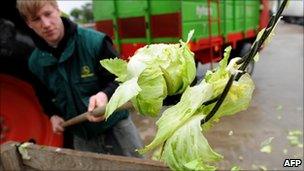E.coli-infected cucumber scare spreads beyond Germany
- Published

The outbreak has prompted farmers to destroy other vegetables too
Authorities in the Czech Republic and Austria have taken some Spanish-grown cucumbers off store shelves over fears they are contaminated with E.coli.
The move came after illness in Germany caused by infected cucumbers led to at least 10 deaths.
The cucumbers, believed to have been imported from Spain and contaminated with E.coli, left people ill with hemolytic-uremic syndrome (HUS).
Hundreds of people are said to have fallen sick.
Officials in the Czech Republic said affected cucumbers may also have been exported to Hungary and Luxembourg.
Austria's Agency for Health and Food Safety said some tomatoes and aubergines had also been included in the ban.
Meanwhile a European Union spokesman said two greenhouses in Spain identified as sources had ceased their activities.
They were now being investigated to see whether the contamination occurred there or elsewhere.
'Predominance of women'
The aggressive form of E.coli is known to cause kidney failure and affect the central nervous system.
Most of the cases have been in the area around Hamburg.
The Sweden-based European Centre for Disease Prevention and Control said this outbreak was "one of the largest described of HUS worldwide and the largest ever reported in Germany".
It said: "While HUS cases are usually observed in children under five years of age, in this outbreak 87% are adults, with a clear predominance of women (68%)."
HUS cases have also been reported in Sweden, Denmark, the Netherlands and the UK, and linked to German travel.
A scientist from Munster university, Helge Karch, warned that the spread of infection was not over, and secondary infections could be passed from person to person.
Czech authorities said the European Union's rapid warning system had told them of an importation of the cucumbers into the Czech Republic.